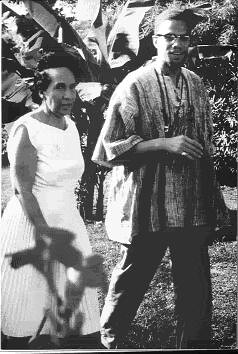Kenyan Student Airlift. The Frank Marshall Davis Network.Obama Snr. US expats/Ghana
GHANA POST IDEPENDENCE POLITICS.
-----------------END RECAP. STORY CONTINUES:
Pages From History: Malcolm X When He Came To Ghana In 1964

Malcolm X of the Muslim Mosque, Inc. and Shirley Graham DuBois, Director of Ghana National Television, at her villa in Accra, Ghana during Malcolm's visit in May 1964. DuBois had thrown a reception in his honor.
The Making Of A Pan-African: Kwame Nkrumah In America
"...In his autobiography, Ghana, Nkrumah recalled that he acquainted himself “with as many political organizations that I could”—that is, groups concerned with black rights and Africa—including the National Urban League and the NAACP.
It was the latter’s special research office that would prove most significant to his pan-African future. It was headed by the brilliant scholar Dr. W. E. B. DuBois, a co-founder of the NAACP, founder and longtime editor of its organ, The Crisis.
Du Bois has been called the “Father of Pan-Africanism” in the 20th century (though Trinidadian barrister Henry Sylvester Williams, convener of the first Pan-African Conference in 1900, has a better claim to the title).
Nkrumah met DuBois near the end of his sojourn in America, about the time the elder intellectual returned to the NAACP after breaking with it a decade earlier over his advocacy of temporary “self-segregation.” Keenly interested in the possibilities for colonial freedom in the wake of the Second World War and the creation of the United Nations, DuBois considered the special research office as “sort of a foreign affairs department of the NAACP.”
Nkrumah also worked with the Council on African Affairs, co-founded by African American social worker Max Yergen and the renaissance man of the 20th century, Paul Robeson...
~SNIP
"...In April 1945, he helped the venerable DuBois organize an international “Colonial Conference” at the old Schomburg Library in Harlem. This little-known conclave was something of a dress rehearsal for the historic Fifth Pan-African Congress, which both men helped to mount in Manchester, England, in October of that year.
One of the continental Africans who assisted them would become yet another father of an African nation: Jomo Kenyatta, known as Mzee (“wise old man”), later the first president of independent Kenya.
Synthesis
Though close to DuBois, Nkrumah also found inspiration in one of his mentor’s old nemeses—the president-general of the Universal Improvement Association and the African Communities League of the World (UNIA-ACL), the largest black mass movement in modern times, a man considered by millions to be a “Black Moses.”
In a famous passage from his autobiography, Nkrumah recalled: “But I think that of all the literature that I studied, the book that did more than any other to fire my enthusiasm was Philosophy and Opinions of Marcus Garvey. Garvey, with his philosophy of ‘Africa for the Africans’ and his ‘Back to Africa’ movement, did much to inspire the Negroes of America in the 1920’s.”
Thus, this young continental African embraced the two great streams of Western pan-Africanism: Garvey’s global nationalist vision of “Africa for the Africans, those at home and those abroad,” and DuBois’ continental vision of a socialist Africa.
In time, Nkrumah would achieve something that neither of these historic rivals would likely have contemplated or approved—a novel synthesis of their competing, yet not wholly uncomplimentary, visions of a free, united, and socialist African nationality.
African American Imprint
After Ghana became independent, Nkrumah expressed his profound debt to Garvey and DuBois.
He resurrected and made ubiquitous the UNIA’s black star symbol. Ghana’s capital square, the old polo grounds, bore its name, and the symbol sat in the center of the nation’s flag. Moreover, the flag’s colors were based on the UNIA’s red, black and green standard.
An even more direct link was the Black Star Steamship Line, named after Garvey’s ill-fated attempt to link the black world in commerce...
Kwame Nkrumah, founder of modern Ghana

Dr. Kwame Francis Nwia Kofie Nkrumah, was a pan-Africanist, and a member of the activist group known as 'The Big Six', and one of the founders of the United Gold Coast Convention. In 1957, Nkrumah became the first President of Ghana after independence from colonial rule from Britain, serving until February 1966, when he was removed from power in a coup d'etat.

Kwame Nkrumah (far left) with the other founders of the UGCC, who became known as 'The Big Six' - after Nkrumah (from left to right) stands Emmanuel O. Obetsebi-Lamptey, Dr Ebenezer Ako-Adjei, Nana William Ofori Atta, Dr Joseph Boakye Danquah, & Edward Akufo-Addo. Ironically, despite this picture of unity against colonial rule, the other five men would all eventually be imprisoned during Nkrumah's administration, with two dying while in custody.
However, by the mid-1960s, despite his accomplishments in developing the African community, Nkrumah's domestic rule had became negative, and later, almost despotic & dictatorial. At the time he ascended to power, the newly independent Ghana had one of the strongest economies in Africa, but by the time he lost power, Ghana was heading towards economic ruin, as a combination of corruption & inefficiency, and his attempts to industrialize Ghana came at the expense of the previously strong-performing cocoa-producing sector. Costly, and largely unsuccessful public works programs also took their toll on the economy...